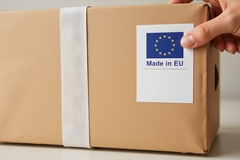EU Single Market Strategy addresses fragmented trade rules for packaging and labels

The fragmentation of rules on packaging, labeling, and waste management is one of the key barriers to effective trade between EU member states, highlighted in the newly released EU Single Market Strategy.
The communication from the European Commission (EC) to the European Parliament, European Council, European Economic and Social Committee, and the Committee of the Regions, identifies internal trade barriers that must be tackled to make “the European Single Market simple, seamless, and strong” in “an uncertain world.”
Packaging Insights speaks to the European Organisation for Packaging and the Environment (EUROPEN), the Belgium-based environmental network Zero Waste Europe (ZWE), and Plastic Recyclers Europe, about the strategy’s implications for packagers, consumers, and the environment.
“The EU Single Market Strategy sends a strong signal that divergent national rules, particularly on packaging, labeling, and waste management, are not in line with the EU’s goals for circularity and competitiveness. For the packaging industry, this points to a much-welcomed shift toward greater harmonization,” says Marzia Scopelliti, senior public affairs manager at EUROPEN.
A Plastics Recyclers Europe spokesperson adds that the strategy aims to address fragmentation in waste and recycling markets by “removing barriers to cross-border waste flows, simplifying and digitalizing compliance processes, and ensuring traceability.”
“These measures must significantly enhance competitiveness for European plastics recyclers and create a Single Market for Waste,” they add.
Meanwhile, Lauriane Veillard, Chemical Recycling and Plastic-to-Fuels policy officer at ZWE argues: “The adoption of EU-wide end-of-waste criteria should not be at the expense of environmental or human health. Product safety should act as a competitive advantage for European production.”
Harmonization is “essential”
EUROPEN’s Scopelliti explains that the Single Market Strategy focuses on two key upcoming initiatives.
 The new strategy targets heterogeneous national EPR schemes, labeling, and end-of-waste criteria.The first is the environmental omnibus proposal (expected in Q4 2025) aimed at simplifying compliance with EPR obligations. The second proposal will address the fragmentation created by heterogeneous national EPR schemes as part of the forthcoming Circular Economy Act (Q4 2026), along with other framework conditions to facilitate the cross-border shipment of waste in the EU.
The new strategy targets heterogeneous national EPR schemes, labeling, and end-of-waste criteria.The first is the environmental omnibus proposal (expected in Q4 2025) aimed at simplifying compliance with EPR obligations. The second proposal will address the fragmentation created by heterogeneous national EPR schemes as part of the forthcoming Circular Economy Act (Q4 2026), along with other framework conditions to facilitate the cross-border shipment of waste in the EU.
Scopelliti says that as the packaging industry prepares to comply with the recyclability and recycled content requirements of the Packaging and Packaging Waste Regulation, “greater harmonization of EPR governing principles and waste rules is essential.”
“Last week, together with more than 50 associations, EUROPEN published a joint industry statement calling for a more consistent enforcement of the minimum EU requirements for EPR and a prohibition on the establishment of state-run Producer Responsibility Organisations, so we welcome that the strategy is prioritizing these issues.”
Dorota Napierska, a toxic-free circular economy policy officer at ZWE, adds: “The EU Single Market Strategy recognizes the need to address the fragmentation created by heterogeneous national EPR schemes, labeling, and end-of-waste criteria.”
However, she also argues that there is a “forgotten” barrier to trade and a single market within the food packaging sector. “The legislation on food contact materials (FCMs) in the EU is chaotic.”
“No EU-wide provisions exist for most types of FCMs, including paper and board, metals, textiles, adhesives, or printing inks. So the EC should prioritize the ongoing revision of the FCM Framework regulation, where addressing such harmonization is planned.”
Plastics Recyclers Europe says that the lack of harmonization of EPR schemes is also a “major” challenge for European plastics recyclers. “Different EPR schemes impose different rules for collection, sorting, and recycling, leading to fragmented material flows and limited access to high-quality plastic waste.”
“In addition, differences in eco-modulation fees and financial incentives create inefficiencies, increase costs, and hamper cross-border trade, which can lead to competitive disadvantages between member states.”
Cross-border packaging
Scopelliti says that removing fragmented national labeling requirements marks a significant step forward for packaging manufacturers and cross-border packaging operations.
 EUROPEN says there should be balance between deregulation and sustainability targets.“These inconsistencies have long disrupted the internal market for packaging and undermined the fundamental principle of the free movement of (packaged) goods within the EU.”
EUROPEN says there should be balance between deregulation and sustainability targets.“These inconsistencies have long disrupted the internal market for packaging and undermined the fundamental principle of the free movement of (packaged) goods within the EU.”
Scopelliti adds that EUROPEN has “consistently” advocated for the elimination of such national barriers, stressing their impact on economies of scale and legal clarity.
“We have also drawn attention to insufficient enforcement of the single market principles in this area, with infringement cases dropping by 60% over the last legislative term — a concerning trend that the Single Market Strategy aims to revert.”
She expects the new strategy to reduce EPR-related administrative burdens, as suggested by the EC. “The strategy’s emphasis on simplifying compliance — especially through the proposed environmental omnibus — is promising.”
“The EC’s commitment to preventing new Single Market barriers while simplifying existing ones shows a clear intention to streamline the EPR framework. However, the impact will depend on the details of the proposals and their implementation by member states.”
Plastics Recyclers Europe adds that “deregulation efforts must be carefully balanced to avoid the counter effects of diluting the ambitious targets or leaving loopholes for the rise of greenwashing claims.”
“Therefore, a harmonized, simplified regulatory framework must improve Single Market efficiency while maintaining high sustainability standards, driving green innovation and reinforcing the EU’s circular economy goals.”
Discussing the balance between deregulation for Single Market efficiency and the need to maintain ambitious sustainability targets, the trade industry representative says: “This strategy rightly highlights that competitiveness and sustainability are not mutually exclusive — they must reinforce one another.”
“Removing national barriers and redundant reporting obligations allows companies to focus more on innovation, R&D, and sustainability, not compliance for compliance’s sake. Achieving one European circular economy, rather than 27 fragmented ones, will accelerate progress toward achieving greater circularity in Europe.”










